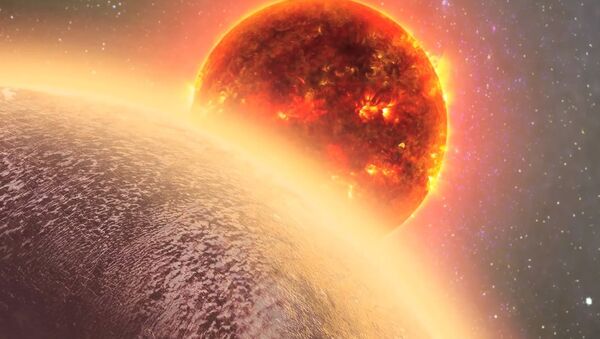Astronomers have discovered a giant exoplanet with a mass three times that of Jupiter revolving on an eccentric egg-shaped orbit around its star, according to a report published by the California Institute of Technology (Caltech).
"This planet is unlike the planets in our solar system, but more than that, it is unlike any other exoplanets we have discovered so far," said Sarah Blunt, the lead author of the study.
What makes so-called HR 5183 b so special, besides its enormous mass, is that unlike the planets of our Solar System, most of its orbit lies far from its parent star.
"If this planet were somehow placed into our own solar system, it would swing from within our asteroid belt to out beyond Neptune," the report detailed.
The planet approaches the star briefly, making a ‘slingshot’ movement as it heads back to the outskirts of its planetary system, not unlike a comet. The entire orbit period is estimated at between 45-100 Earth years.
"This planet spends most of its time loitering in the outer part of its star’s planetary system in this highly eccentric orbit, then it starts to accelerate in and does a slingshot around its star," noted Andrew W. Howard, Caltech professor of astronomy. "We detected this slingshot motion. We saw the planet come in and now it's on its way out. That creates such a distinctive signature that we can be sure that this is a real planet, even though we haven't seen a complete orbit."
Astronomers explain that, under normal circumstances, planets over long periods of time adopt a roughly circular orbit, and for a planet to have an eccentric orbit like HR 5183 b, a catastrophic event is likely to be at cause. The most plausible scenario would be a collision with another planet of comparable mass. If that was the case, HR 5183 b likely knocked the other planet out of the system entirely, the scientists suggest.
"This newfound planet basically would have come in like a wrecking ball," said Howard, "knocking anything in its way out of the system."
The discovery underscores how drastically different from our Solar System other planetary systems can be, the scientists observed.
"Copernicus taught us that Earth is not the center of the Solar System, and as we expanded into discovering other solar systems of exoplanets, we expected them to be carbon copies of our own Solar System," Howard explained, "But it's just been one surprise after another in this field. This newfound planet is another example of a system that is not the image of our Solar System but has remarkable features that make our universe incredibly rich in its diversity."



